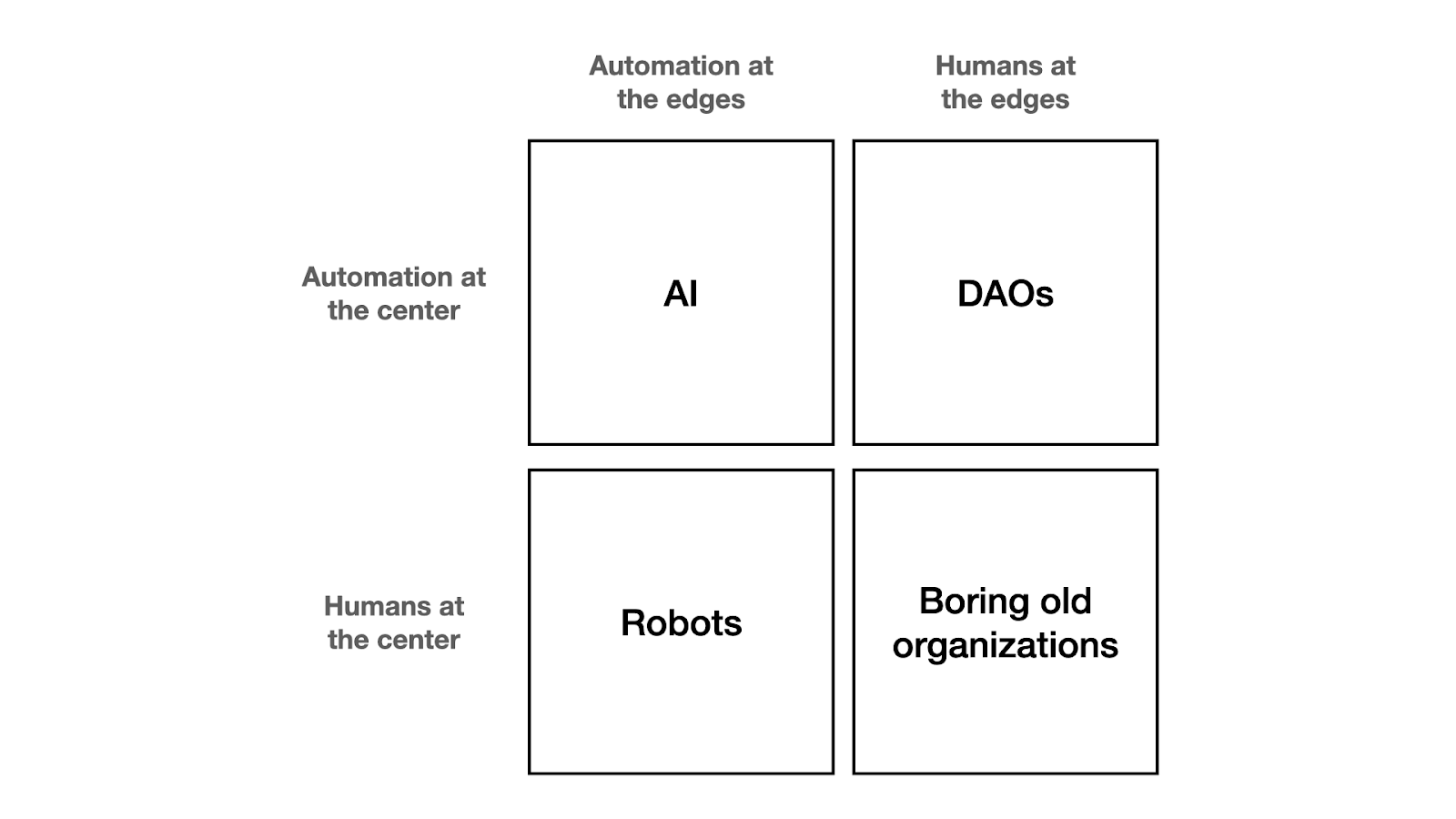What will the DAO democratize?
DAO (Decentralized Autonomous Organization) is an organization in which people with the same objectives are geographically dispersed and each act autonomously to promote business without a specific owner or manager.
DAOs are characterized by the following three points.
- Transparent and fair decision-making as contracts are executed by smart contracts
- Governance tokens are issued and distributed, participants have decision-making power and can vote on DAO decisions
- The influence of a participant's voting rights depends on how much they have contributed to the DAO
This article summarizes the definition, types, and examples of DAOs. Although DAOs are not familiar to us at this time, it is highly likely that DAO-like organizations will increase in the future, thus it is useful to accumulate insights from now.
Defining DAO by center and edge
When you hear the term DAO, decentralized autonomous organization, it may be difficult to get an image of what kind of organization it is. DAO may seem like a bit of a buzzword, and with so many different definitions of DAO, it is difficult to determine which one is the correct definition. Let's go back to the origin and look at the definition of DAO proposed by Ethereum founder Vitalik Buterin in 2014.

Created by the author based on DAOs, DACs, DAs and More: An Incomplete Terminology Guide
The figure above was created by the author based on the schematic diagram of DAO Vitalik Buterin presented in 2014. DAOs are characterized by the following two features.
- Automation at the center
- Humans at the edges
The center here can be read as "decision-making" and the edge as "specific tasks". In other words, in DAO, decisions are made based on algorithms, and the specific tasks resulting from them are handled by humans. DAO does not mean that all activities are automated.
In DAO, specific work by participants is valued as contributions, and they receive rewards in form of tokens. Contributions can take various forms, and there will be many scenes in which strengths that were not valued in the existing paradigm can be utilized. In the future, people will be able to make a living doing what they love and are good at in a lean way of working, such as moving around several DAOs.
The three categories of DAO by authority distribution
Balaji Srinivasan, former chief technology officer of the U.S. crypto asset exchange Coinbase, classifies DAOs into three categories in terms of distribution of authority.
① Autonomous DAO: truly self-driven on smart contracts without an administrator or chief executive officer
② Bureaucratic DAO: Multiple decision makers
③ CEO DAO (DAO with a chief executive officer): one clear decision maker
Translated from https://twitter.com/balajis/status/1494244523983081475?s=20&t=q7XdV4LB-JdyZS2bjQn1Xxg
There is no need to think which of these are truly correct. This is because which type of DAO fits the situation will vary depending on the context. For example, if quick decision-making is required, (3) would be superior instead of (1). On the other hand, if more democratic decision-making is needed, then (1) may be more attractive instead of (3).
Case study of DAO from Japan: Henkaku
Joichi Ito is involved in developing web3 projects as chief architect at Digital Garage, Inc. He also serves as the director of the Center for Transformation established by the Chiba Institute of Technology. He leads the DAO "Henkaku," which issues HENKAKUs with no monetary value but provides community membership, votes on proposals, and engagement to project management. The HENKAKU Membership NFT, which is a DAO membership card, was used as authentication in the IRL meetup HENKAKU BAR.
Related Article: Possibility of NFT
Joichi Ito, who has been active as an entrepreneur since the dawn of the Web, mentions that the atmosphere of Web 3.0 is like that of when the Internet first appeared. This may be because ordinary people could achieve freedom by new technology. At Henkaku, the team is conducting many experiments towards the goal of creating a DAO that values diversity and allows its members to contribute what they like to do. As a DAO from Japan, "Henkaku" is one of the DAOs to follow up.
Related Article: Why is Web3.0 gaining popularity
DAO is the democratization of decision making
We went through DAO in this article, but we think it will be difficult for DAOs to immediately disrupt traditional organizations and become widely adopted. This may be because of the user experience, or because the technology supporting DAO is not yet mature and has not been theorized. However, DAO is the democratization of decision-making, and it is certain that DAO will gradually spread through the world while coexisting with traditional organizations.